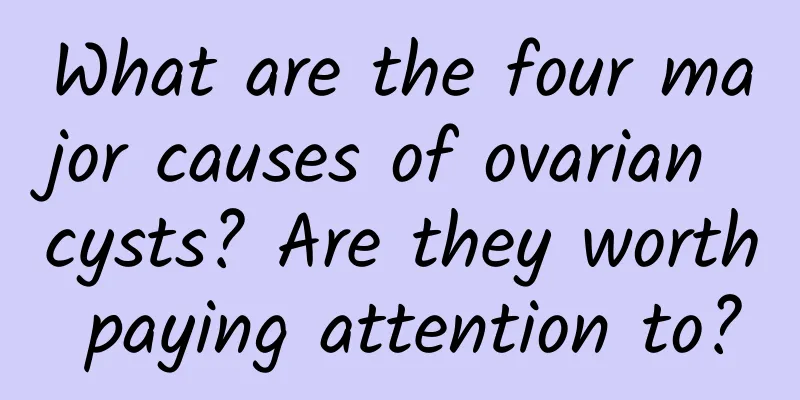When will menstruation come after abortion? What should I do if menstruation does not come two months after abortion?

|
When will menstruation come after abortion? What should I do if menstruation does not come two months after abortion? After an abortion, the time it takes to get your period back varies. Generally, your first period after surgery usually occurs within 4 to 6 weeks, but in some cases it may take longer. So, not having your period for two months after an abortion is not necessarily abnormal, but if you haven't had your period for a long time, you should consult your doctor to understand the specific situation. Abortion is a safe and effective contraceptive method and is an important choice for women who do not want to get pregnant. After a woman has an abortion, her menstrual cycle often changes because the endometrium has been removed. During the first menstrual cycle after surgery, menstruation may be delayed or advanced due to the effects of surgery on the uterus. This is because surgery stimulates the repair process of the endometrium, leading to adjustments in the menstrual cycle. This change is common within one to two months after surgery and is a normal physiological phenomenon. But if menstruation still does not occur two months after surgery, we need to consider other factors. First, other diseases in the female body may cause menstrual disorders. For example, changes in hormone levels, ovarian dysfunction, endocrine disorders, etc. may affect the normal recovery of menstruation. In addition, stress, anxiety, changes in lifestyle habits, and the presence of other diseases may also affect the menstrual cycle. In this case, women should consult a doctor promptly for an accurate diagnosis and treatment recommendations. The doctor will take a detailed medical history and may perform some necessary tests to determine the cause of the delayed menstruation. Depending on the specific situation, the doctor may recommend blood tests or imaging tests to rule out other possible diseases. In general, not having a period two months after an abortion is not necessarily abnormal, but women need to be alert to the possibility of menstrual disorders. If you still do not have a period two months after the operation, it is recommended to see a doctor in time to determine the specific cause and receive appropriate treatment. In addition, women should pay attention to maintaining good living habits, reducing stress, and staying healthy, which will help restore and adjust the menstrual cycle. Although abortion is a common and safe procedure, any surgery carries certain risks. To avoid unnecessary risks and discomfort, women should learn as much as possible about the relevant information before undergoing an abortion and follow the doctor's instructions and advice after the procedure. In addition, you can also communicate with your doctor to learn more about the specific time and precautions for menstruation recovery so that you can be prepared accordingly. Missing your period two months after an abortion is not necessarily abnormal, but it should not be ignored. If you are facing such a problem, please consult a doctor as soon as possible to get an accurate diagnosis and treatment advice. Maintaining good living habits and a positive attitude will help promote the resumption of menstruation and maintain good health. |
>>: What causes uterine fibroids? Real photos of uterine fibroids
Recommend
250,000 sit-ups can help you lose 0.5 kg
Recently, white-collar workers who are busy fight...
What is the cause of hydatidiform mole pregnancy?
Molar pregnancy is usually caused by malnutrition...
What are the common characteristics of primary pain?
Primary dysmenorrhea is a common type of dysmenor...
Treatment of uterine fibroids with the method of promoting blood circulation and removing blood stasis
Over the past six months, Ms. Liu has experienced...
What are uterine fibroids
Uterine fibroids are hormone-dependent tumors, us...
How long can you live with cervical precancerous lesions?
Regular follow-up after surgery, currently using ...
How much do you know about the early symptoms of uterine fibroids?
The incidence of uterine fibroids is high, becaus...
White blood cell count after bacterial vaginosis is cured
Women who do not understand what bacterial vagino...
Do people who sit for a long time have lower body obesity? 7 exercises to slim down your legs
[Key Points]: Showing off a pair of slender legs ...
What are the dangers of cervical fibroids
Uterine fibroids are the most common benign tumor...
When is the best time to have an abortion?
Commonly used early abortion surgeries include va...
Exercise is always ineffective? 5 Ways to Burn Calories Fast
Why do I not see any results even though I have a...
How is cervical hypertrophy diagnosed?
Cervical hypertrophy is a common gynecological di...
Coffee is a "superfood"! Drinking coffee before and after exercise not only burns calories, but also has "these" benefits
In order to stay alert, office workers drink a cu...
What are the dangers of multiple uterine fibroids? Will multiple uterine fibroids worsen the disease?
Multiple uterine fibroids grow very fast, or afte...









